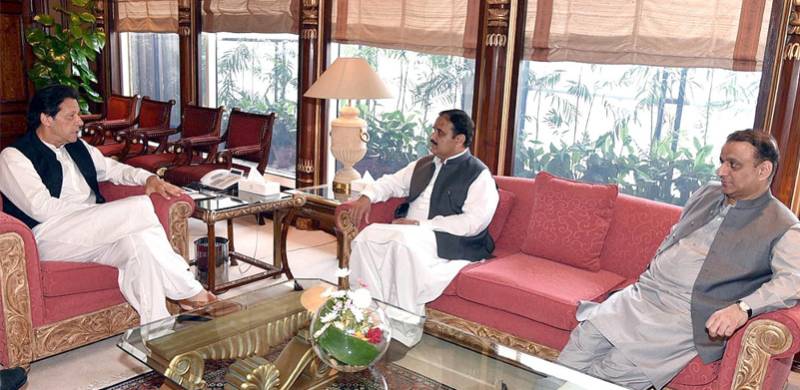
Monday, November 26, marks 100 days since Imran Khan took oath as the Prime Minister of Pakistan, as his Pakistan Tehreek-e-Insaf (PTI) formed governments in the centre, Khyber Pakhtunkhwa and Punjab.
While contrasting noise is being created from the government and opposition camps about these 100 days, the PTI government in Punjab has witnessed, and orchestrated, a mixed bag.
Electables aboard
Following a surprise win over the Pakistan Muslim League (PML-N) in Punjab in the general elections, the Pakistan Tehreek-e-Insaf (PTI) installed Sardar Usman Buzdar as the administrative head of the province. This came after Jahangir Tareen, the party’s influential aide, had made arrangements with the elected independent lawmakers.
In the July 25 general polls, PML-N (127) had a marginal victory over PTI (122) in Punjab. However, the support of Pakistan Muslim League-Quaid (7) and over two dozen independents allowed PTI to form the government.
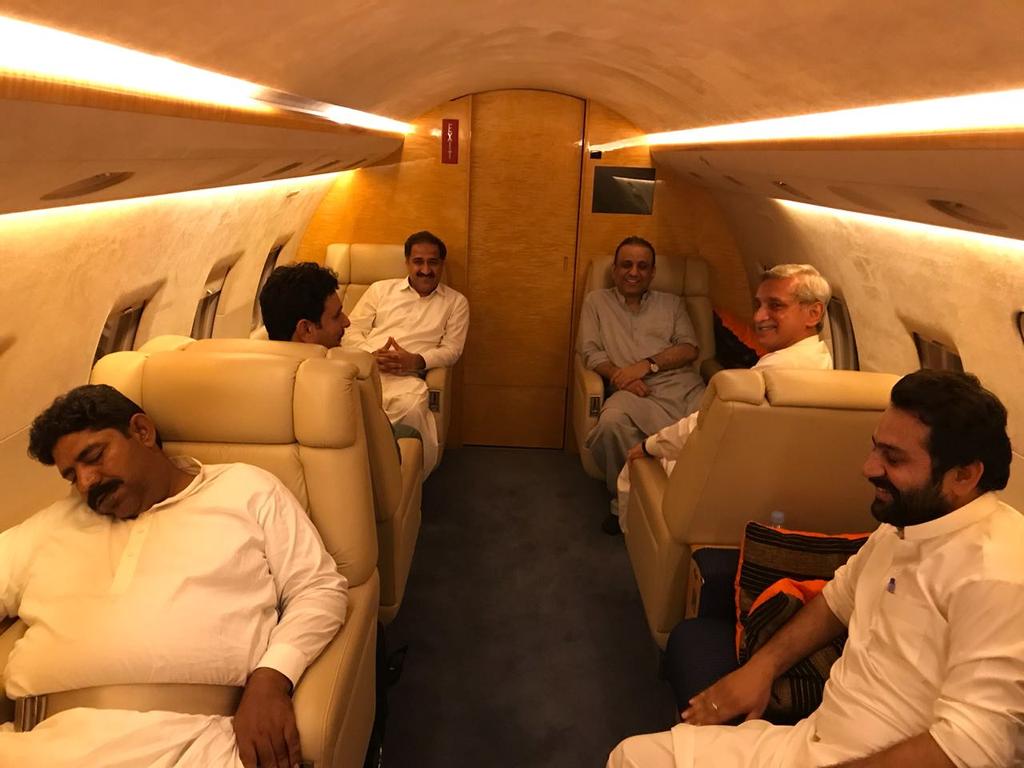
These numbers were largely aided by the PTI fielding a range of ‘electables’ across the province, many of them had defected – and in some cases forced to do so – almost on the eve of the elections.
However, that lead suffered a minor hit in the October 14 by-elections, where six out of 12 seats were clinched by the PTI’s predecessors in Punjab – but the strength in numbers is still with PTI and its allies.
PML-N rebound?
The PML-N succeeded in winning back the support in spite of its president being in the National Accountability Bureau’s (NAB) custody days before the by-polls. Shehbaz Sharif was arrested by NAB in connection to the Rs 14 billion Ashiana Housing Scheme, over allegation of misappropriating funds and contracts.
The arrest was interpreted by the PML-N leadership as an establishment-backed move to manufacture the by-elections, with the party continuing to accuse the judiciary and NAB of facilitating PTI’s political fortunes.
“It’s common knowledge that this is the Pakistan Tehreek-e-Insaf (PTI) government taking revenge. But they should be prepared to face the treatment they are meting out to their opponents,” PML-N supreme leader and former premier Nawaz Sharif said in a statement issued after Shehbaz Sharif’s arrest.
Resentment and retort
The fact that PTI only secured four out of 12 Punjab Assembly seats in the by-polls was peddled by the PML-N leadership an offshoot of resentment among the masses. However, the PML-N still remains wary of the PTI led government’s continued efforts to target the senior PML-N leadership.
The influence enjoyed by the PML-Q as PTI’s coalition partner in Punjab, with party president Pervez Elahi the current Punjab Assembly speaker, is also a cause for apprehension among the PML-N leadership.
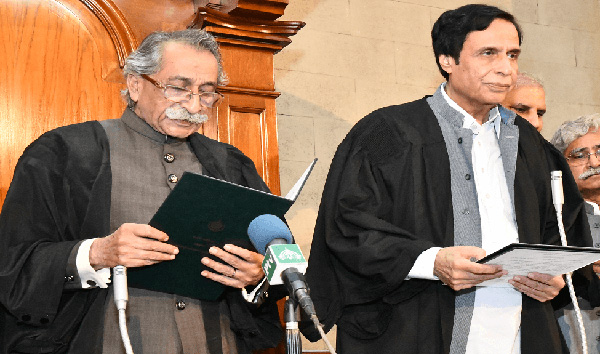
On October 26, the PML-N led opposition boycotted the assembly session. This was owing to Punjab Assembly Speaker Elahi’s ban on six PML-N lawmakers for their alleged involvement in damaging furniture and causing ruckus. The PTI government then set a new precedent by approving its first budget for the fiscal year 2018-19 in the absence of opposition lawmakers in the house.
No buzz for Buzdar
PTI’s decision to pick Buzdar as the CM, even though he only joined PTI a few weeks before the general polls, came as a shock to many – none more so than his own party leaders. Buzdar is believed to be Tareen’s pick and is touted by PM Imran Khan as a “solider for change” given his roots in Dera Ghazi Khan.
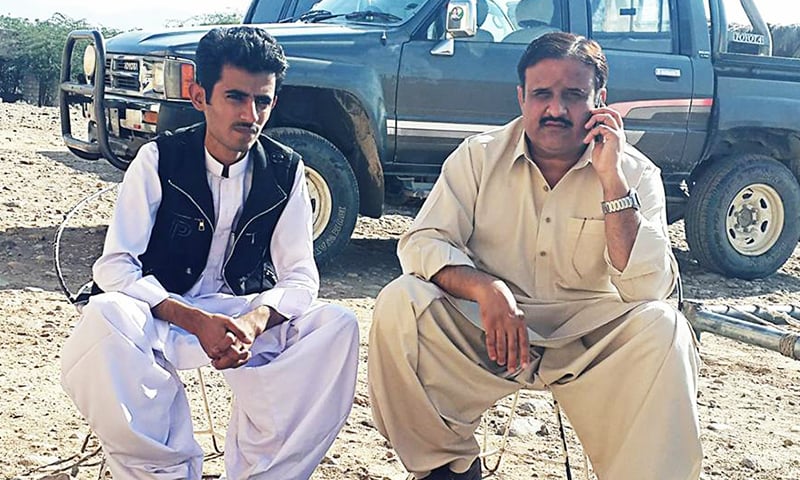
Buzdar’s appeal, however, is yet to resonate with the masses, and is being seen as one reason behind PTI’s electoral struggles in the by-elections. Meanwhile, sections within the PTI see the decision to put Buzdar in the highest position as a manoeuvre to forestall senior leader Abdul Aleem Khan, a real estate mogul, who has appeared before NAB multiple times in assets inquiry.
Populism?
Meanwhile, the Rs2.027tr budget has come under criticism for its ‘populist’ overtures. The government has slashed the development fund by almost half while not reducing the costs of security and debt programmes citing ‘austerity’ reasons.
Although Insaf Sehat Card was announced, health and education saw minor increments coupled with major development cuts seemingly to lower the expectations of the masses owing to the financial turmoil. A number of initiatives of the PML-N, including outsourcing of government schools, have been continued. However, CM Buzdar’s administration has ended subsidy on the fares of metro buses, the brainchild transit project of the ex-CM Shehbaz.
Agri-business stakeholders have also expressed discontent with the Punjab government’s draft of new Agriculture Policy 2018 saying that it is tilted in favour of multinational companies and will not offer a level playing field for domestic consumers.
Promises?
Other prominent initiatives taken by the PTI government, includes its drive for anti-encroachment in all major districts of the province, clean and green programme, and baby steps to materialise south Punjab province dream.
“The establishment of a South Punjab province was included in our manifesto, and PTI will fulfill its commitment,” said Punjab governor and PTI leader Chaudhry Muhammad Sarwar in a press conference. “Our priorities are rule of law, accountability, merit, education and health. Losing some seats in by-elections does not indicate the failure of the PTI government or any loss in its popularity.”
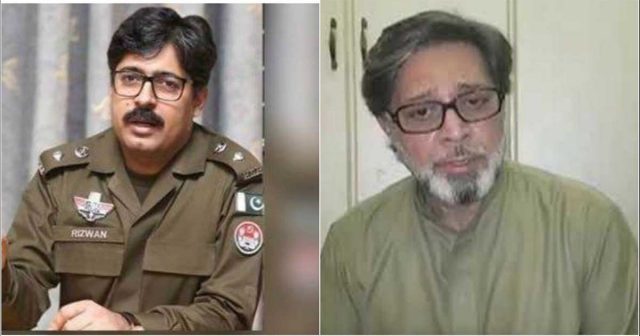
Even so, major promises in PTI’s manifesto are still being scrutinised by its critics. Among these is PM Khan’s idea of a de-politicised police, which came under the spotlight following former Pakpattan District Police Officer Rizwan Gondal’s transfer in the immediate aftermath of the PTI government taking oath.
Reforms pending
An inquiry report found that the CM’s Office interfered in the police matters and ordered transfer of district officer following a dispute with PM’s wife Bushra Bibi’s ex-husband, Khawar Maneka. Moreover, the police official was asked to apologise to Maneka at the latter’s dera.
Meanwhile, the government’s police reforms committee was rendered headless after the resignation of Nasir Durrani, ex-police chief who was lauded for his efforts in the KP under PTI’s rue, which came in the backdrop of Punjab IG Amjad Saleemi’s removal.
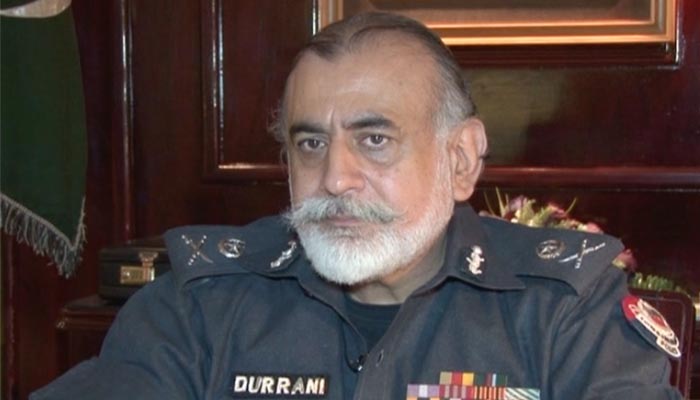
“The PTI said they would depoliticise the police, similar to the lies that they told about Khyber Pakhtunkhwa. First the DPO Pakpattan incident and then their own man Nasir Durrani said I want to salvage my honour and leave. Then you have the example of the IG Punjab,” said PML-N spokesperson Marriyum Aurangzeb.
“The government spokesperson himself has said the one who won’t listen will be sent back home. They changed the entire bureaucracy, the entire Lahore administration, on a Sunday. Let alone depoliticisation, we are now witnessing the formal start of doing politics through the police,” she added.
The government has put a hold on the local body reforms and devolution of power as most of the local government positions are held by the PML-N representatives. The local government system will have to wait a little longer for funds and powers till a PTI-backed setup is elected in the next LG polls.
Displacements
PTI’s anti-encroachment drive has come under criticism for rendering scores homeless. However, the party leadership claims that the poor aren’t being targeted.
“No action is being taken against the slums. We are only targeting the land mafia, which grabs land for commercial reasons,” said Punjab Senior Minister for Local Government and Community Development Aleem Khan, asking the opposition to refrain from confrontational politics.
“Thieves have come together under Nawaz Sharif’s leadership and are being guided by Asif Ali Zardari. They should refrain from confrontational politics and play their democratic role,” he added.
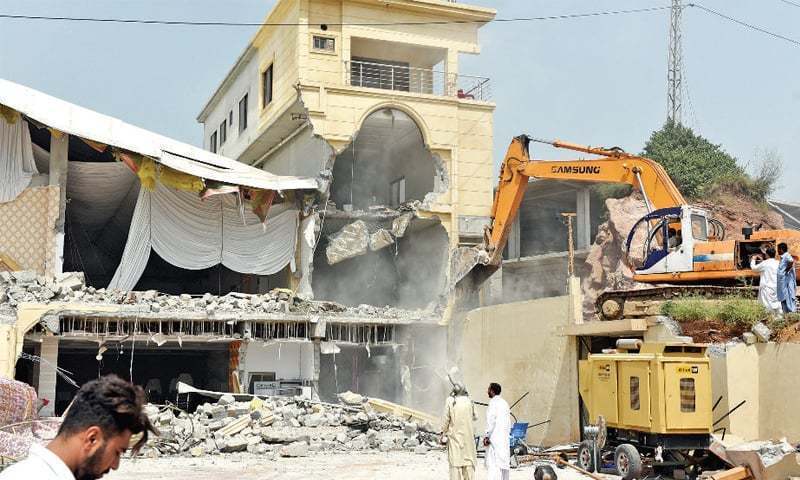
However, it remains a fact that many families have been displaced as part of the anti-encroachment drive, even if the PTI government has promised to compensate them.
The Naya Pakistan Housing Programme that promises to build five million homes is being seen as a positive development, which can house the masses and allow local business to thrive under foreign development. But it remains to be seen if the PTI government can fulfill that vow.
Senate success
During the mid-November Senate elections, the PTI won an additional two Senate seats from Punjab, overcoming the challenge posed by the PML-N, following the relative setback in the October by-elections.
The election was held after the disqualification of PML-N leaders Sadia Abbasi and Haroon Akhtar owing to their dual nationalities, with the PTI bagging both the general seat and the one reserved for women.
The two seats were won by Waleed Iqbal – Allama Iqbal’s grandson – and Seemi Azidi – Jehangir Tareen’s sister, as the PTI made the most of its increased strength in the Punjab Assembly post general elections.
However, where the PTI is building on electoral strength, its writ has been challenged in the shape of the state’s familiar foes.
The TLP threat
Over the past month, the greatest challenge for the PTI government across the country has been posed by the Tehrik-e-Labbaik Pakistan (TLP), with the Punjab government bearing most of the brunt. During the three-day protest against the acquittal of Asia Bibi Punjab suffered Rs260 million in losses.
The TLP’s agreements with the federal and Punjab government were seen as surrender on the state’s part, with no action being taken against the radical Islamist group’s leadership, which had issued death threats to the Army Chief and the Supreme Court judges from Lahore, in front of the Punjab Assembly.
https://www.youtube.com/watch?v=eCNLcnOIfcQ
However, the Punjab government arrested at least 1,135 people linked with the TLP over the weekend of November 24-25 under the Maintenance of Public Order (MPO) Ordinance with the party chief Khadim Hussain Rizvi taken under protective custody ahead of the TLP’s announcement of a rally in the capital.
Who rules?
After crossing the 100-day mark, perhaps the greatest question mark over the PTI government remains with regards to who actually governs the Punjab province. This question was brought to the fore earlier this month when a video was leaked showcasing Punjab Assembly Speaker and PML-Q leader Pervaiz Elahi, along with Federal Minister Tariq Cheema asking PTI leader Jehangir Tareen to “control” Punjab Governor Chaudhary Sarwar. While Sarwar later refuted claims that he was getting too big for his shoes and maintained the Chief Minister Buzdar was the “centre of power” the episode makes public the open secret that it’s Tareen who holds the ultimate authority in Punjab.
https://twitter.com/syedkousarkazmi/status/1061358946173231104
Given that Tareen was disqualified for life under the same judgment that was given against Nawaz Sharif, this reality is in stark contrast to the one agenda that has dominated PTI’s pre and post-election rhetoric: financial accountability.
Tareen’s omnipresence at the de facto helm of Punjab dilutes any credibility that of PTI’s anti-corruption drive, in addition to rendering the ‘power centre’ CM Buzdar a pawn for the actual powers.
It is this question and the fulfilment of its many other promises that the PTI government would be scrutinised on the 101st day in power and beyond – as it looks to cling on to its slender lead in the Punjab Assembly.
While contrasting noise is being created from the government and opposition camps about these 100 days, the PTI government in Punjab has witnessed, and orchestrated, a mixed bag.
Electables aboard
Following a surprise win over the Pakistan Muslim League (PML-N) in Punjab in the general elections, the Pakistan Tehreek-e-Insaf (PTI) installed Sardar Usman Buzdar as the administrative head of the province. This came after Jahangir Tareen, the party’s influential aide, had made arrangements with the elected independent lawmakers.
In the July 25 general polls, PML-N (127) had a marginal victory over PTI (122) in Punjab. However, the support of Pakistan Muslim League-Quaid (7) and over two dozen independents allowed PTI to form the government.

These numbers were largely aided by the PTI fielding a range of ‘electables’ across the province, many of them had defected – and in some cases forced to do so – almost on the eve of the elections.
However, that lead suffered a minor hit in the October 14 by-elections, where six out of 12 seats were clinched by the PTI’s predecessors in Punjab – but the strength in numbers is still with PTI and its allies.
PML-N rebound?
The PML-N succeeded in winning back the support in spite of its president being in the National Accountability Bureau’s (NAB) custody days before the by-polls. Shehbaz Sharif was arrested by NAB in connection to the Rs 14 billion Ashiana Housing Scheme, over allegation of misappropriating funds and contracts.
The arrest was interpreted by the PML-N leadership as an establishment-backed move to manufacture the by-elections, with the party continuing to accuse the judiciary and NAB of facilitating PTI’s political fortunes.
Also read: Imagine a democracy where the Leader of Opposition is imprisoned
“It’s common knowledge that this is the Pakistan Tehreek-e-Insaf (PTI) government taking revenge. But they should be prepared to face the treatment they are meting out to their opponents,” PML-N supreme leader and former premier Nawaz Sharif said in a statement issued after Shehbaz Sharif’s arrest.
Resentment and retort
The fact that PTI only secured four out of 12 Punjab Assembly seats in the by-polls was peddled by the PML-N leadership an offshoot of resentment among the masses. However, the PML-N still remains wary of the PTI led government’s continued efforts to target the senior PML-N leadership.
The influence enjoyed by the PML-Q as PTI’s coalition partner in Punjab, with party president Pervez Elahi the current Punjab Assembly speaker, is also a cause for apprehension among the PML-N leadership.

On October 26, the PML-N led opposition boycotted the assembly session. This was owing to Punjab Assembly Speaker Elahi’s ban on six PML-N lawmakers for their alleged involvement in damaging furniture and causing ruckus. The PTI government then set a new precedent by approving its first budget for the fiscal year 2018-19 in the absence of opposition lawmakers in the house.
No buzz for Buzdar
PTI’s decision to pick Buzdar as the CM, even though he only joined PTI a few weeks before the general polls, came as a shock to many – none more so than his own party leaders. Buzdar is believed to be Tareen’s pick and is touted by PM Imran Khan as a “solider for change” given his roots in Dera Ghazi Khan.

Buzdar’s appeal, however, is yet to resonate with the masses, and is being seen as one reason behind PTI’s electoral struggles in the by-elections. Meanwhile, sections within the PTI see the decision to put Buzdar in the highest position as a manoeuvre to forestall senior leader Abdul Aleem Khan, a real estate mogul, who has appeared before NAB multiple times in assets inquiry.
Populism?
Meanwhile, the Rs2.027tr budget has come under criticism for its ‘populist’ overtures. The government has slashed the development fund by almost half while not reducing the costs of security and debt programmes citing ‘austerity’ reasons.
A number of initiatives of the PML-N, including outsourcing of government schools, have been continued. However, CM Buzdar’s administration has ended subsidy on the fares of metro buses, the brainchild transit project of the ex-CM Shehbaz.
Although Insaf Sehat Card was announced, health and education saw minor increments coupled with major development cuts seemingly to lower the expectations of the masses owing to the financial turmoil. A number of initiatives of the PML-N, including outsourcing of government schools, have been continued. However, CM Buzdar’s administration has ended subsidy on the fares of metro buses, the brainchild transit project of the ex-CM Shehbaz.
Agri-business stakeholders have also expressed discontent with the Punjab government’s draft of new Agriculture Policy 2018 saying that it is tilted in favour of multinational companies and will not offer a level playing field for domestic consumers.
Promises?
Other prominent initiatives taken by the PTI government, includes its drive for anti-encroachment in all major districts of the province, clean and green programme, and baby steps to materialise south Punjab province dream.
“The establishment of a South Punjab province was included in our manifesto, and PTI will fulfill its commitment,” said Punjab governor and PTI leader Chaudhry Muhammad Sarwar in a press conference. “Our priorities are rule of law, accountability, merit, education and health. Losing some seats in by-elections does not indicate the failure of the PTI government or any loss in its popularity.”

Even so, major promises in PTI’s manifesto are still being scrutinised by its critics. Among these is PM Khan’s idea of a de-politicised police, which came under the spotlight following former Pakpattan District Police Officer Rizwan Gondal’s transfer in the immediate aftermath of the PTI government taking oath.
Reforms pending
An inquiry report found that the CM’s Office interfered in the police matters and ordered transfer of district officer following a dispute with PM’s wife Bushra Bibi’s ex-husband, Khawar Maneka. Moreover, the police official was asked to apologise to Maneka at the latter’s dera.
Meanwhile, the government’s police reforms committee was rendered headless after the resignation of Nasir Durrani, ex-police chief who was lauded for his efforts in the KP under PTI’s rue, which came in the backdrop of Punjab IG Amjad Saleemi’s removal.

“The PTI said they would depoliticise the police, similar to the lies that they told about Khyber Pakhtunkhwa. First the DPO Pakpattan incident and then their own man Nasir Durrani said I want to salvage my honour and leave. Then you have the example of the IG Punjab,” said PML-N spokesperson Marriyum Aurangzeb.
“The government spokesperson himself has said the one who won’t listen will be sent back home. They changed the entire bureaucracy, the entire Lahore administration, on a Sunday. Let alone depoliticisation, we are now witnessing the formal start of doing politics through the police,” she added.
The government has put a hold on the local body reforms and devolution of power as most of the local government positions are held by the PML-N representatives. The local government system will have to wait a little longer for funds and powers till a PTI-backed setup is elected in the next LG polls.
Displacements
PTI’s anti-encroachment drive has come under criticism for rendering scores homeless. However, the party leadership claims that the poor aren’t being targeted.
“No action is being taken against the slums. We are only targeting the land mafia, which grabs land for commercial reasons,” said Punjab Senior Minister for Local Government and Community Development Aleem Khan, asking the opposition to refrain from confrontational politics.
“Thieves have come together under Nawaz Sharif’s leadership and are being guided by Asif Ali Zardari. They should refrain from confrontational politics and play their democratic role,” he added.

However, it remains a fact that many families have been displaced as part of the anti-encroachment drive, even if the PTI government has promised to compensate them.
The Naya Pakistan Housing Programme that promises to build five million homes is being seen as a positive development, which can house the masses and allow local business to thrive under foreign development. But it remains to be seen if the PTI government can fulfill that vow.
Senate success
During the mid-November Senate elections, the PTI won an additional two Senate seats from Punjab, overcoming the challenge posed by the PML-N, following the relative setback in the October by-elections.
The election was held after the disqualification of PML-N leaders Sadia Abbasi and Haroon Akhtar owing to their dual nationalities, with the PTI bagging both the general seat and the one reserved for women.
The two seats were won by Waleed Iqbal – Allama Iqbal’s grandson – and Seemi Azidi – Jehangir Tareen’s sister, as the PTI made the most of its increased strength in the Punjab Assembly post general elections.
However, where the PTI is building on electoral strength, its writ has been challenged in the shape of the state’s familiar foes.
The TLP threat
Over the past month, the greatest challenge for the PTI government across the country has been posed by the Tehrik-e-Labbaik Pakistan (TLP), with the Punjab government bearing most of the brunt. During the three-day protest against the acquittal of Asia Bibi Punjab suffered Rs260 million in losses.
The TLP’s agreements with the federal and Punjab government were seen as surrender on the state’s part, with no action being taken against the radical Islamist group’s leadership, which had issued death threats to the Army Chief and the Supreme Court judges from Lahore, in front of the Punjab Assembly.
https://www.youtube.com/watch?v=eCNLcnOIfcQ
However, the Punjab government arrested at least 1,135 people linked with the TLP over the weekend of November 24-25 under the Maintenance of Public Order (MPO) Ordinance with the party chief Khadim Hussain Rizvi taken under protective custody ahead of the TLP’s announcement of a rally in the capital.
Who rules?
After crossing the 100-day mark, perhaps the greatest question mark over the PTI government remains with regards to who actually governs the Punjab province. This question was brought to the fore earlier this month when a video was leaked showcasing Punjab Assembly Speaker and PML-Q leader Pervaiz Elahi, along with Federal Minister Tariq Cheema asking PTI leader Jehangir Tareen to “control” Punjab Governor Chaudhary Sarwar. While Sarwar later refuted claims that he was getting too big for his shoes and maintained the Chief Minister Buzdar was the “centre of power” the episode makes public the open secret that it’s Tareen who holds the ultimate authority in Punjab.
https://twitter.com/syedkousarkazmi/status/1061358946173231104
Given that Tareen was disqualified for life under the same judgment that was given against Nawaz Sharif, this reality is in stark contrast to the one agenda that has dominated PTI’s pre and post-election rhetoric: financial accountability.
Tareen’s omnipresence at the de facto helm of Punjab dilutes any credibility that of PTI’s anti-corruption drive, in addition to rendering the ‘power centre’ CM Buzdar a pawn for the actual powers.
It is this question and the fulfilment of its many other promises that the PTI government would be scrutinised on the 101st day in power and beyond – as it looks to cling on to its slender lead in the Punjab Assembly.
